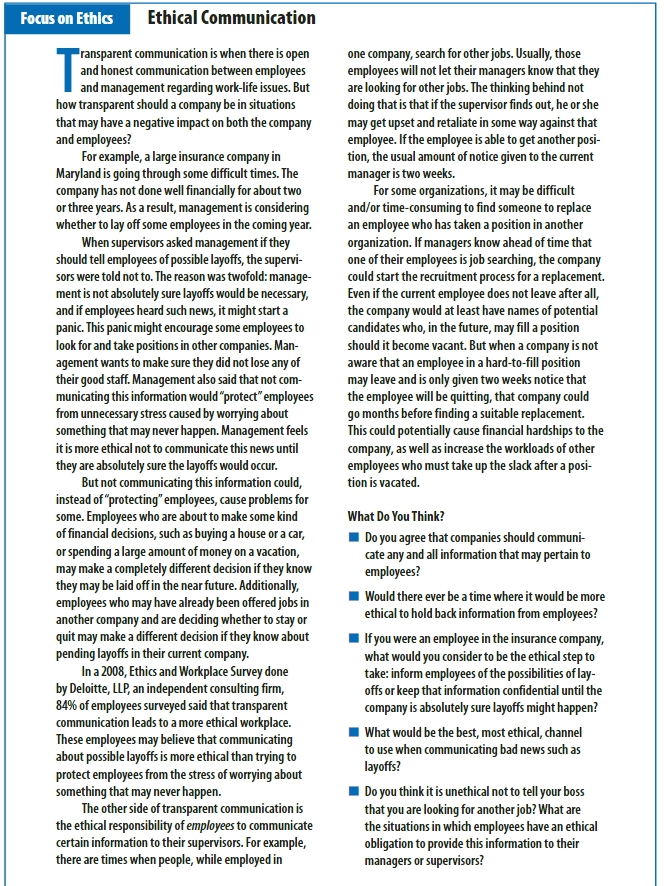Answered step by step
Verified Expert Solution
Question
1 Approved Answer
Focus on Ethics Ethical Communication ransparent communication is when there is open and honest communication between employees how transparent should a company be in

Focus on Ethics Ethical Communication ransparent communication is when there is open and honest communication between employees how transparent should a company be in situations that may have a negative impact on both the company and employees? For example, a large insurance company in Maryland is going through some difficult times. The company has not done well financially for about two or three years. As a result, management is considering whether to lay off some employees in the coming year. When supervisors asked management if they should tell employees of possible layoffs, the supervi- sors were told not to. The reason was twofold: manage- ment is not absolutely sure layoffs would be necessary, and if employees heard such news, it might start a panic. This panic might encourage some employees to look for and take positions in other companies. Man- agement wants to make sure they did not lose any of their good staff. Management also said that not com- municating this information would "protect" employees from unnecessary stress caused by worrying about something that may never happen. Management feels it is more ethical not to communicate this news until they are absolutely sure the layoffs would occur. But not communicating this information could, instead of "protecting" employees, cause problems for some. Employees who are about to make some kind of financial decisions, such as buying a house or a car, or spending a large amount of money on a vacation, may make a completely different decision if they know they may be laid off in the near future. Additionally, employees who may have already been offered jobs in another company and are deciding whether to stay or quit may make a different decision if they know about pending layoffs in their current company. In a 2008, Ethics and Workplace Survey done by Deloitte, LLP, an independent consulting firm, 84% of employees surveyed said that transparent communication leads to a more ethical workplace. These employees may believe that communicating about possible layoffs is more ethical than trying to protect employees from the stress of worrying about something that may never happen. The other side of transparent communication is the ethical responsibility of employees to communicate certain information to their supervisors. For example, there are times when people, while employed in one company, search for other jobs. Usually, those employees will not let their managers know that they are looking for other jobs. The thinking behind not doing that is that if the supervisor finds out, he or she may get upset and retaliate in some way against that employee. If the employee is able to get another posi- tion, the usual amount of notice given to the current manager is two weeks. For some organizations, it may be difficult and/or time-consuming to find someone to replace an employee who has taken a position in another organization. If managers know ahead of time that one of their employees is job searching, the company could start the recruitment process for a replacement. Even if the current employee does not leave after all, the company would at least have names of potential candidates who, in the future, may fill a position should it become vacant. But when a company is not aware that an employee in a hard-to-fill position may leave and is only given two weeks notice that the employee will be quitting, that company could go months before finding a suitable replacement. This could potentially cause financial hardships to the company, as well as increase the workloads of other employees who must take up the slack after a posi- tion is vacated. What Do You Think? Do you agree that companies should communi- cate any and all information that may pertain to employees? Would there ever be a time where it would be more ethical to hold back information from employees? If you were an employee in the insurance company, what would you consider to be the ethical step to take: inform employees of the possibilities of lay- offs or keep that information confidential until the company is absolutely sure layoffs might happen? What would be the best, most ethical, channel to use when communicating bad news such as layoffs? Do you think it is unethical not to tell your boss that you are looking for another job? What are the situations in which employees have an ethical obligation to provide this information to their managers or supervisors?
Step by Step Solution
There are 3 Steps involved in it
Step: 1

Get Instant Access to Expert-Tailored Solutions
See step-by-step solutions with expert insights and AI powered tools for academic success
Step: 2

Step: 3

Ace Your Homework with AI
Get the answers you need in no time with our AI-driven, step-by-step assistance
Get Started


